Happy Monday! Your Morning Dispatchers have decided to give up on weekend plans for the foreseeable future—though we can’t say that we had it as badly on Sunday as CNN’s Wolf Blitzer.
Quick Hits: Today’s Top Stories
- After weeks of mounting pressure from Democratic Party leaders and elected officials, President Joe Biden announced in a series of tweets on Sunday afternoon that he was dropping out of the 2024 presidential race and endorsing Vice President Kamala Harris to serve as the Democratic nominee. “While it has been my intention to seek reelection, I believe it is in the best interest of my party and the country for me to stand down and to focus solely on fulfilling my duties as President for the remainder of my term,” Biden, who spent the last several days in Delaware recovering from COVID-19, wrote in a letter. Harris confirmed that she would enter the race later on Sunday, saying, “My intention is to earn and win this nomination.” Dozens of high-profile Democrats, including potential challengers for the nomination, endorsed her bid. Meanwhile, many top Republicans called for Biden to resign from the White House before his term expires in January, questioning his ability to serve as president for the remaining several months. “If Joe Biden is not fit to run for President, he is not fit to serve as President,” GOP House Speaker Mike Johnson said in a statement. “He must resign the office immediately. November 5 cannot arrive soon enough.”
- CrowdStrike, a cybersecurity company that provides antivirus software to many Microsoft Windows computers, caused a large-scale computer malfunction on Friday when it pushed out an update to the millions of computers that run its program. The error in the update led to thousands of flights being canceled on Friday and into the weekend, as well as closures to railways and disruptions to 911 services. Losses caused by the outage could top more than $1 billion, making the IT meltdown potentially the largest in U.S. history. The company said Sunday that “a significant number” of devices affected by the outage were back online.
- Israel bombed the Houthi-controlled port city of Hodeidah in Yemen on Saturday, just days after the Houthis claimed responsibility for a drone attack on Tel Aviv that killed one person. Israel’s attack comes as retaliation for not only last week’s drone attack, but for a months-long campaign of terrorism and maritime attacks, including hundreds of individual strikes, as Hodeidah has been used by the Houthi militia to launch drone and missile attacks on ships passing through the Red Sea. The airstrike targeted the port—which the Israel Defense Forces say is used by the Houthis to receive weapons from Iran—as well as a “dual-use” power station, which was used for both military and civilian purposes. The Houthi-controlled Ministry of Health claimed that at least 80 people were wounded in the attack, most with severe burns.
- United States Secret Service Director Kimberly Cheatle will answer questions before the Republican-majority House Oversight Committee on Monday amid calls from members of Congress for her resignation following the July 13 assassination attempt on former President Donald Trump. Rep. Brendan Boyle of Pennsylvania on Saturday became the first Democratic member of Congress to call for Cheatle to resign. “The evidence coming to light has shown unacceptable operational failures,” Boyle said in a statement. “I have no confidence in the leadership of the United States Secret Service if Director Cheatle chooses to remain in her position.” The Secret Service acknowledged Saturday that the agency had denied several requests from Trump’s security team for additional help over the last two years—a reversal from what a Secret Service spokesman said last week. The Wall Street Journal reported Friday that the shooter had flown a drone over the campaign rally site hours prior to his attempt on Trump’s life.
- New Hampshire Gov. Chris Sununu signed a bill on Friday that will prevent students in grades 5 through 12 from joining sports teams for a different sex than that on their birth certificate, requiring schools to designate teams as either for girls, boys, or co-ed. Sununu also signed a measure banning gender transition surgeries for minors, as well as one that will require schools to notify parents when there will be discussions of human sexuality and allow them to opt their children out. The governor vetoed a bill that would have allowed institutions to restrict access to multi-person bathrooms and locker rooms on the basis of biological sex, arguing that it “in some cases it seeks to solve problems that have not presented themselves in New Hampshire, and in doing so, invites unnecessary discord.”
- Democratic Rep. Sheila Lee Jackson of Texas died on Friday at the age of 74. Jackson—who had represented Texas’ 18th Congressional District continuously since 1995 and ran unsuccessfully for mayor of Houston last year—announced in June that she had been diagnosed with pancreatic cancer, but her family did not announce a cause of death. It’s unclear whether Gov. Greg Abbott will call a special election to fill her seat for the remainder of the term, which expires in January.
Biden Finally Passes the Torch
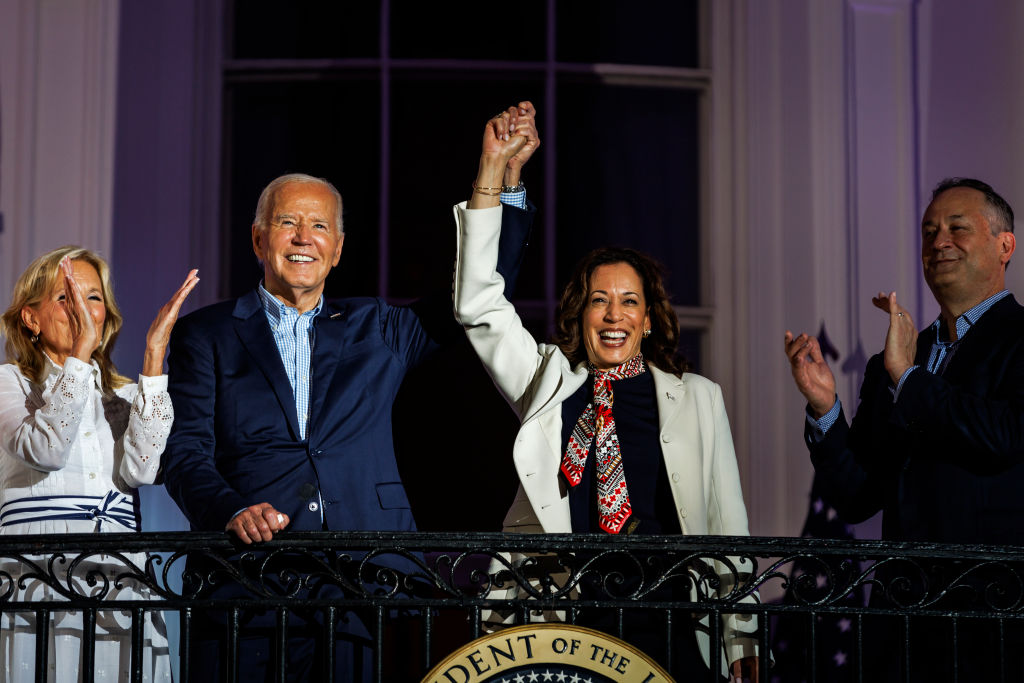
President Joe Biden will be a one-term president.
That may be the only thing we can say for certain today. After more than three weeks of unrelenting pressure from politicos, donors, and members of his own party, the 81-year-old president announced his decision to withdraw from the presidential race on Sunday and almost immediately endorsed Vice President Kamala Harris to succeed him. Key lawmakers, kingmakers, and potential nominees seemed to quickly fall in line with Harris as the new standard-bearer, but the matter is nowhere near settled as Democrats start the countdown to their Chicago convention—now just three weeks away—where the party will formally pick a ticket to face off against former President Donald Trump and his running mate, Sen. J.D. Vance of Ohio, in November.
There was no dramatic East Room address to close out Biden’s ill-fated presidential campaign on Sunday, nor a rally where he could make a show of passing the torch to the next generation—as he once promised to do.
No, the president—recovering from COVID-19 at his Rehoboth, Delaware, residence—instead took a page out of his predecessor’s book, delivering history-changing news in a tweet. The statement reportedly came together in less than 24 hours over the weekend, the work of a tight circle of just a couple of Biden’s most trusted advisers. Harris apparently learned of Biden’s decision only minutes before the tweet went live, and many White House staffers found out their boss was dropping out of the race when they saw it on social media.
“While it has been my intention to seek reelection,” Biden wrote in the letter posted early Sunday afternoon, “I believe it is in the best interest of my party and the country for me to stand down and to focus solely on fulfilling my duties as President for the remainder of my term.”
Scores and scores of Democrats had been waiting to hear those words since Biden’s disastrous debate performance on June 27. The president, whom voters have long believed is too old to do the job, looked feeble and gaunt and sounded functionally incoherent during the debate, shocking even loyal Democrats into pushing for a change at the top of their party’s ticket.
Since June 27, roughly three dozen congressional Democrats had publicly called on the president to step aside, including several sitting senators. Former House Speaker Nancy Pelosi, Senate Majority Leader Chuck Schumer, and House Minority Leader Hakeem Jeffries had reportedly warned Biden in recent days that he was destined for a shellacking in November, and that he would be a potentially majority-losing drag on House and Senate races. Donors—and the people who assemble them—were jumping ship, too, prompting questions about whether the president’s war chest could hold out until November.
As we’ve reported several times, Biden made a handful of unsuccessful attempts to reassure his erstwhile allies and the American people that the debate was “one bad night,” as so many Biden surrogates put it, and not the norm for an octogenarian three years into arguably the most stressful job in the world. He did sit-down interviews, called into MSNBC’s Morning Joe, and delivered remarks from a teleprompter at several campaign events. He also addressed the nation in prepared remarks about the Supreme Court, during an hour-long press conference to cap the NATO Summit, and in an Oval Office address about the attempt on Trump’s life last week.
And those appearances were, by-and-large, not pretty. When faced with questions about his age and fitness, Biden was frequently defensive and hostile. At the NATO summit, he confused Harris for Trump in his first answer—after only hours earlier calling Ukrainian President Volodymyr Zelensky “President Putin.” When asked by NBC News’ Lester Holt what would happen if he had another “episode” like he had at the debate, Biden paused, tried to repeat the question, and uttered something the NBC News transcript could only mark down as “INAUDIBLE.” In a recent interview with Black Entertainment Television, Biden seemed unable to recall the name of his own secretary of defense, Lloyd Austin, calling him instead “the black man.”
Such performances did little, if anything, to assuage voters’ concerns. Biden’s poll numbers—already poor before the debate—have been in freefall in the weeks since. As of Wednesday, 65 percent of Democrats surveyed by the Associated Press-NORC thought he should step aside. One by one, formerly safe blue states—like Virginia, New Hampshire, and New Mexico—turned purple or were at risk of moving into “toss-up” territory. The latest national polling from CBS News showed Trump running 5 points ahead of Biden. All the while, Biden insisted the polling wasn’t accurate. “You guys keep saying that,” Biden told ABC News’ George Stephanopolous earlier this month, when Stephanopolous pressed him about falling behind in the polls. “Do you—look, you know polling better than anybody. Do you think polling data as accurate as it used to be?”
The steady stream of leaks from concerned Democrats and public calls for Biden’s withdrawal seemed to dry up immediately after the assassination attempt on Trump last Saturday, but it was a rushing river once again again by the latter half of the week. On Wednesday, Biden was diagnosed with COVID-19, and retreated to Delaware. On Friday, some dozen more Democratic lawmakers called on him to step aside.
The Biden campaign and the White House were unwavering in their denials of the rumors late last week that Biden was nearing a decision to withdraw from the race. “Joe Biden is more committed than ever to beat Donald Trump,” Jen O’Malley Dillon, the Biden campaign chair, said on Morning Joe Friday morning. Twice that same day, White House senior deputy press secretary Andrew Bates tweeted denials of reports that Biden was considering dropping out, saying “Keep the faith.”
Biden was reportedly telling his own staff as late as Saturday morning that it was “full steam ahead” on his reelection bid, and seemed set to hit the campaign trail again next week, after he’d recovered from COVID-19.
But that changed Saturday evening. Steve Ricchetti and Mike Donilon, two of Biden’s closest advisers, drove from Washington, D.C., to Delaware to tell him that new internal polling—the first of some crucial battlegrounds in two months—had revealed there was now no path to victory in November, Politico reported on Sunday. Not only was he losing in the six key swing states, he was cruising toward a loss in Virginia and New Mexico. Biden finally believed the numbers.
At 1:45 p.m. ET, he informed some key staff he was dropping out. At 1:46 p.m. ET, the tweet went live.
His announcement was followed about 30 minutes later by a full endorsement of Harris. “My very first decision as the party nominee in 2020 was to pick Kamala Harris as my Vice President,” he tweeted. “And it’s been the best decision I’ve made. Today I want to offer my full support and endorsement for Kamala to be the nominee of our party this year.”
Harris, for her part, quickly put out a statement of her own confirming she was interested in the top of the ticket. “I am honored to have the President’s endorsement and my intention is to earn and win this nomination,” she tweeted.
Before Biden dropped out, who would replace him in the event that he did was more or less an open question. While Harris was viewed as the favorite, a handful of Democratic up-and-comers—including Govs. Josh Shapiro of Pennsylvania, Gretchen Whitmer of Michigan, Roy Cooper of North Carolina, Andy Beshear of Kentucky, Jared Polis of Colorado, Gavin Newsom of California, and J.B. Pritzker of Illinois—seemed like potential contenders who could try to leapfrog the unpopular vice president.
But in a flash on Sunday, Democrats—who had spent the last month in the deepest kind of disarray—fell squarely in line behind Harris as they praised Biden for his selflessness and patriotism. Nearly 150 of the 212 Democratic House members and 32 of the 51 senators who vote with the Democratic majority endorsed Harris. The vast majority of the governors who’d seemed most likely to try to box her out backed Harris, as did Transportation Secretary Pete Buttigieg—potentially in an effort to earn the running mate nod. “The best path forward for the Democratic Party is to quickly unite behind Vice President Harris and refocus on winning the presidency,” Shapiro said in a statement. “The contrast in this race could not be clearer and the road to victory in November runs right through Pennsylvania—where this collective work began. I will do everything I can to help elect Kamala Harris as the 47th President of the United States.”
In another boost for Harris, the Democratic fundraising platform ActBlue reported that it had taken in more than $50 million in donations on Sunday, one of the strongest fundraising days Democrats have ever seen. The Biden reelection campaign reported having almost $100 million cash-on-hand at the end of June—and it’s unclear whether or how Harris or any other nominee could get ahold of that money. Politico reported that the $95 million war chest would automatically transfer to Harris to use, since she was already on a ticket with Biden and the Biden campaign transferred the FEC filing into her name.
But our own Sarah Isgur is not so sure. “This was a primary. Joe Biden was running the primary,” Sarah explained on Dispatch Live (🔒) Sunday night. “Joe Biden dropped out of the primary—same as lots of people do in every primary. You don’t just get to give all of your money to your favorite candidate who’s still in the primary. … [Harris is] not officially on anything.” The Biden PAC could, Sarah suggested, transfer the money to the Democratic National Committee for it to spend on her behalf.
Endorsements and fundraising aside, in order to formally become her party’s nominee at the convention in Chicago set for August 19-21, Harris would have to secure the votes of the more than 4,000 Democratic delegates—many of whom, unlike the Republican Party’s delegates, are professional political operatives vetted for loyalty to the president. Harris and her team are reportedly already making calls to shore up their support, and with Biden’s endorsement, it seems likely that she will be able to secure the requisite number to become the nominee.
The opponent switcheroo is a development the Trump campaign has been preparing for, egging on, and dreading, all at once. “Crooked Joe Biden is the Worst President, by far, in the History of our Nation,” Trump posted on social media shortly after the announcement, gloating over Biden’s decision to drop out. “He was not fit to serve from the very beginning, but the people around him lied to America about his Complete and Total Mental, Physical, and Cognitive Demise.”
But in a perhaps more revealing post just a few hours later, the reality of facing another opponent seemed to have hit the former president. “So, we are forced to spend time and money on fighting Crooked Joe Biden, he polls badly after having a terrible debate, and quits the race,” he wrote. “Now we have to start all over again. Shouldn’t the Republican Party be reimbursed for fraud?”
Indeed, Tim Alberta, who interviewed Trump campaign co-chairs Chirs LaCivita and Susie Wiles, wrote for The Atlantic last week that the campaign wasn’t prepared for another opponent. “If Wiles and LaCivita were too successful—if too many Democrats decided, too quickly, that Biden was no longer capable of defeating Trump, much less serving another four years thereafter—then they risked losing an ideal opponent against whom their every tactical maneuver had already been deliberated, poll-tested, and prepared,” he reported. “Campaigns are usually on guard against peaking too soon; in this case, the risk for Trump’s team was Biden bottoming out too early.”
The Republican narrative in the aftermath of Biden’s decision seemed to coalesce around the idea that Biden should resign the presidency if he’s too impaired to run for reelection—and that Harris was complicit in covering up Biden’s mental state. The main super PAC for Trump on Sunday launched ads in key battleground states to that effect, saying Harris was “in on it” and had worked to cover up “Joe Biden’s obvious mental decline.”
At this point, what this all means for the general election is anyone’s guess. But back in January, former U.N. Ambassador Nikki Haley predicted that “the first party to retire its 80-year-old candidate is going to be the one who wins this election.”
Democrats are surely hoping that she was right.
Worth Your Time
- Writing for the Washington Post, Megan McArdle explored the questions posed by the CrowdStrike IT meltdown. “It’s quite efficient for one firm to serve a large number of important customers, as CrowdStrike does,” she wrote. “In some ways, these concentrated players might provide greater reliability, because they develop a lot of expertise by serving many users, and they can invest more in R&D and security than Bob’s Friendly Local Software Co. can. But when outages happen, they happen to seemingly everyone, everywhere, all at once, leaving users no alternatives. How best to try to manage the trade-off between efficiency and redundancy is a hard question for another day. For the moment, the important thing is to recognize that it exists, and that there’s no easy way around it. We probably should have thought more about such trade-offs when the Great Efficiency Drive was underway. We’ll have to think even harder about them now.”
Presented Without Comment
Democratic Sen. Brian Schatz of Hawaii, in a tweet referencing Kamala Harris’ viral “coconut tree” saying: “Madam Vice President, we are ready to help.”

Also Presented Without Comment
Associated Press: South Korea Restarts Blaring Propaganda Broadcasts to Retaliate Against North’s Trash Balloon Flying
In the Zeitgeist
California rock band Dawes released the first single off its new album—Oh Brother, out in October—last week. While Declan may take issue with the implication in one lyric in “House Parties” that there’s ever a “wrong time of year” to go to Chicago, we think it’s a fun, light-hearted “yacht rock”-esque tune to get us through these, well, trying times. And for the record, it’s right about Chicago.
Toeing the Company Line
- Will Kamala Harris seize the Democratic nomination? Who would be her running mate? What happens next? Sarah, Jonah, Steve, Mike, and Drucker answered all those questions and more on yet another emergency Dispatch Live (🔒). Members who missed the conversation can catch a rerun—either video or audio-only—by clicking here.
- In the newsletters: The Dispatch Politics team took a look at the “two sides” of former President Donald Trump’s 90-minute speech at the RNC convention, Nick highlighted the (🔒) unserious nature of American politics, Jonah reminded readers that character is destiny, Chris argued that (🔒) last week’s RNC can’t match the drama that was playing out at the White House, and Jennifer Brick Murtazashvili explained in Dispatch Faith how antisemitism in Pittsburgh eroded her hope for unity following the tragedy of Hamas’ October 7 attacks.
- On the podcasts: Charlotte interviewed Hen Mazzig, a senior fellow at the Tel Aviv Institute, on The Skiff (🔒) to discuss the state of Israel’s war in Gaza, Jonah reflected on the RNC in the weekend solo Remnant, and Jamie is joined on today’s episode of The Dispatch Podcast by Eliot Cohen, professor emeritus at Johns Hopkins School of Advanced International Studies, to discuss what a second Trump term would mean for U.S. foreign policy.
- On the site over the weekend: Ethan McGuire reviewed Kevin Costner’s latest western epic, Horizon, Guy Denton sat down for a conversation with Ace Frehley, the original lead guitarist for the rock band KISS, Samuel Benson documented the Latter-day Saint theology of immigration, and Warren reported on President Joe Biden’s decision to withdraw from the 2024 presidential race.
- On the site today: Jeffery Tyler Syck explains what went wrong with the Intercollegiate Studies Institute, Cole Aronson and Avi Bell make the case for an expanded IDF role in post-Hamas Gaza, and Peter, in what was originally going to be today’s main TMD story, reports on the IT meltdown that left millions of airline passengers stranded over the weekend.
Let Us Know
Do you think Kamala Harris will ultimately be the Democratic nominee? How will Biden be remembered by history for his decision to withdraw from the race?*
Clarification, July 22, 2024: Updated the Let Us Know question to more accurately describe the decision from President Biden to withdraw from the race.


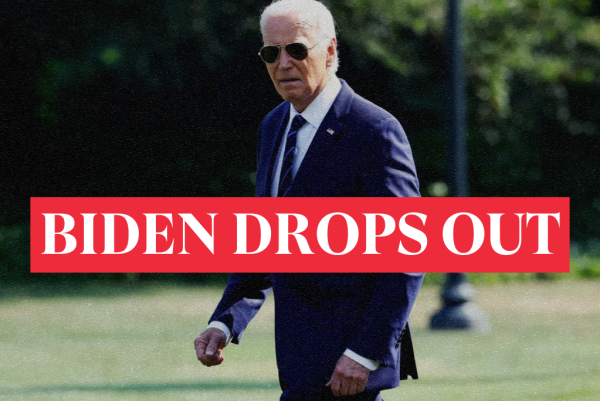
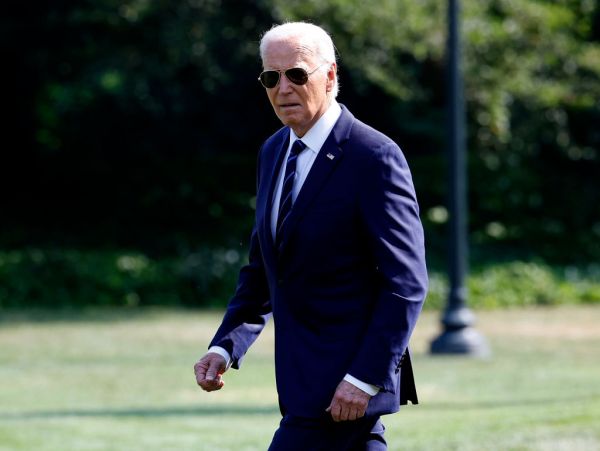
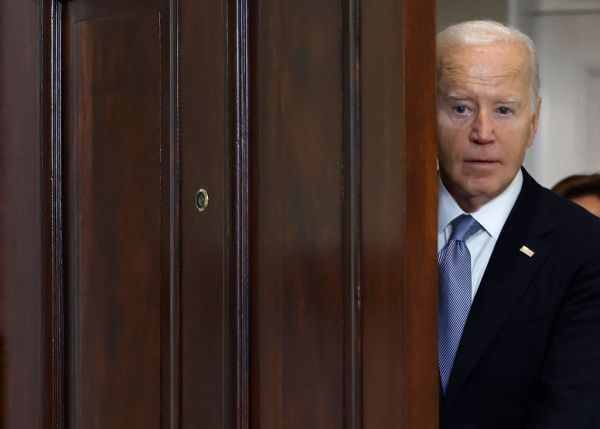

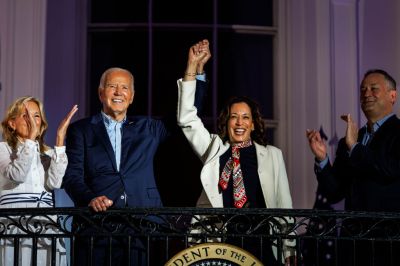
Please note that we at The Dispatch hold ourselves, our work, and our commenters to a higher standard than other places on the internet. We welcome comments that foster genuine debate or discussion—including comments critical of us or our work—but responses that include ad hominem attacks on fellow Dispatch members or are intended to stoke fear and anger may be moderated.
With your membership, you only have the ability to comment on The Morning Dispatch articles. Consider upgrading to join the conversation everywhere.